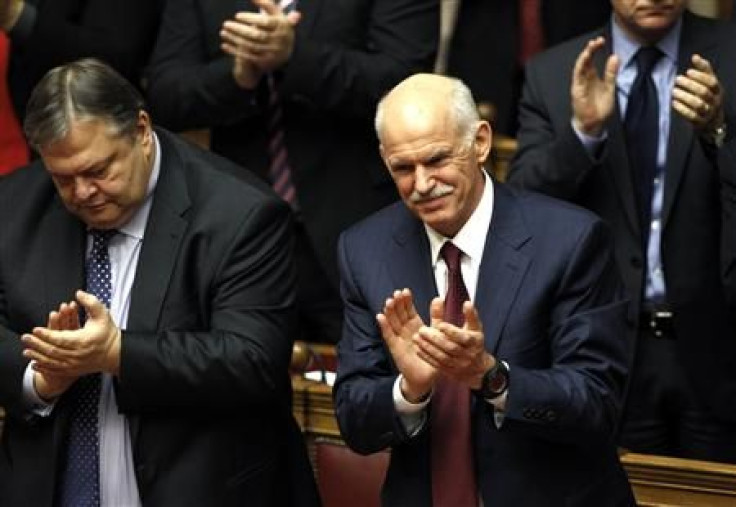Greek PM to Push Coalition Plan in Meeting with President

Greek Prime Minister George Papandreou is meeting with Greek President Karolos Papoulias Saturday in the drive for a new coalition government to save the nation from bankruptcy and prevent its debt crisis from spreading chaos across the Eurozone.
The premier is due to meet the president at noon (6 a.m. EDT), hours after surviving a parliamentary confidence vote and signaling he was ready to resign.
In a late-night speech to parliament, Papandreou said the new coalition should be formed to ram a 130 billion euro ($179 billion) bailout deal through the assembly, the last financial lifeline for a nation that is due to run out of money in December.
Without saying when he would quit, Papandreou, who has led Greece through two years of social, political, and economic turmoil, said he was ready to discuss who should lead the new government, which would rule until elections are conducted, probably early next year.
The last thing I care about is my post. I don't care even if I am not re-elected. The time has come to make a new effort ... I never thought of politics as a profession, Papandreou told parliament before the vote in the early hours of Saturday.
Under heavy domestic and international pressure, Papandreou has backed down on a proposal for a referendum on the Eurozone rescue. Greek voters could well have rejected the deal, potentially sinking Eurozone leaders' attempts to stop the debt crisis devastating economies such as Italy and Spain.
Things May Turn Ugly
Burdened by waves of spending and welfare cuts plus tax increases that have pushed the country into a long recession, Greeks expressed disgust at the political wrangling inparliament.
I'm sick of politicians in Greece, and feel that things will now turn ugly. If only they could cooperate, everything would be much better, said Tassos Pagonis, a 48-year-old taxi driver in Athens. But will Greece be saved? I'm afraid not. Europeans don't trust us anymore; they will throw us out.
Pagonis expressed a fear widespread in the nation -- that Greece might be forced out of the Eurozone to go it alone with a revived national currency. I hope we don't return to the drachma, he said.
Pensioner Yiannis Vlahos, 83, compared the fates of Greece and Germany, which occupied the country during World War II.
When the Germans left, we had some hope. They were ruined by World War II, but they worked hard and became the strongest economy. We Greeks haven't learned our lesson, we only steal, he said. We ourselves hate our beautiful country.
Papandreou's socialist government won with 153 votes in the 300-member parliament, and a rebellion by some dissidents in his PASOK party failed to materialize after he indicated that his term as prime minister was close to an end.
The leaders of France and Germany told Papandreou this week that Greece would not get a cent more of aid if Greece failed to approve the bailout, meaning the state would run out of money in December.
Newspapers labeled Panadreou's confidence victory as little more than a deal paving the way for a new government without Papandreou. The pro-government Ta Nea ran with a New government now! headline.
Greece has been racked by torment since soon after Papandreou won power in 2009 and revealed that the real budget deficit was three times bigger than original estimates put out by his conservative predecessor.
International investors took fright, Greece's borrowing costs soared, and Papandreou was forced to go cap in hand last year to the only bodies still willing to lend at affordable rates -- the European Union and International Monetary Fund.
In return, they demanded wave after wave of spending cuts, tax hikes, and pension cuts, which provoked widespread protests on the streets on Greek cities, with bloody clashes between demonstrators and riot police in Athens.
No Rapid Elections
Papandreou dismissed demands for rapid elections as championed by the opposition. Elections at this moment not only equal disaster but could not take place in the best interest of the people, he said.
There is one solution. To support the [EU bailout] deal with a multiparty approach, without elections, with a strong government.
Masamichi Adachi, senior economist at JP Morgan Securities Japan, said the main concern was what would happen when international lenders returned to Athens in the coming months to assess the progress of the austerity plan and find them failing again.
This is just pushing away the timing of the real problem. Of course, it's welcome that Greece didn't blow up today, but it doesn't solve the problem.
Analysts said Papandreou's victory had been Pyrrhic, and many ordinary Greeks said they were disenchanted with the Byzantine political wrangling that was not addressing their basic need for jobs and cash.
Sources said Finance Minister Evangelos Venizelos has won the backing of leaders of some smaller parties to support a new coalition that he would head. The new government would call early elections in a few months after the bailout was secured, sources close to the deal told Reuters.
The leaders of the far-right LAOS party and another center-right party indicated after Papandreou's speech that they would cooperate in a new coalition.
In parliament, Venizelos said a new government should rule until next February and then call elections.
Opposition leader Antonis Samaras counted his New Democracy party out of the coalition, saying Papandreou had spurned his call for a national unity government. Mr. Papandreou rejected our proposal. The only solution is elections, he said.
(Additional reporting by Reuters Athens bureau; Writing by David Stamp; Editing by Rosalind Russell)
© Copyright Thomson Reuters 2024. All rights reserved.












